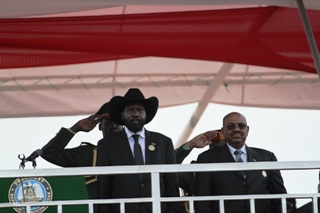Commentators warn of Juba re-submission to Khartoum
October 26, 2013 (JUBA) – A number of South Sudanese famous political commentators in the country have raised serious concerns over what they said was a process of re-submission to Khartoum by Juba leadership at the expense of the new nation’s vital national interests.

The deals on the four freedoms include cross-border movement, employment in each other’s country and ownership of property in either country as well as the right to residency.
However, the two presidents and their governments gave little or no consideration about the other burning issues such as the fate of the 2,000km border demarcation process between the two countries, several disputed areas, including Heglig or Panthou as well as the fate of the Dinka Ngok of Abyei.
A senior official in the ministry of health, Thuou Loi, also a famous columnist with the Juba Monitor newspaper on Saturday warned the leadership of South Sudan about the approach with which the cunning national congress party (NCP) leadership of Khartoum is redefining the relations between the two former foes two years after the split.
While there is nothing wrong with the four freedoms trade off negotiated by the two countries, Loi said there was, however, a serious concern when such a transaction comes at the expenses of some of the more pressing issues such as the case of Abyei, Panthou and the demarcation of the borders.
His views, which are shared by many South Sudanese in Juba, suggested that the NCP successfully shut down the discussions on the critical issues between the two countries and took the South Sudan’s leadership for a ride on issues that are of more beneficial to Khartoum.
“This is exactly what the National Congress Party [NCP] achieved in its recent diplomatic shuttle to Juba. It was a well calculated move by the NCP to ensure that not much focus is given to the critical issues mentioned earlier. This should be a serious source of concern for the leadership and people of South Sudan,” he wrote in his column.
Khartoum has shown public optimism that its relations with its former foe would now improve faster following the recent cabinet shake-up in South Sudan which saw the removal of senior leaders who were very instrumental during the negotiations with Khartoum for the last ten years.
Juba has recently backed down on Abyei’s unilateral conduct of referendum, despite facilitating its process in the past, after Khartoum showed refusal to the proposal by the African Union, which resolved that the Dinka Ngok would vote in a referendum this October to choose between joining Sudan or South Sudan.
The new position by the South Sudan leadership, which is in line with Khartoum’s position, seems to have scared the African Union and the United Nations Security Council, that see the risk involved if the Dinka Ngok go it alone.
Another senior South Sudanese columnist with Almasir daily Arabic newspaper, Abraham Malik, earlier warned of a scenario where Khartoum may forge a reunion with South Sudan in the form of a confederation.
He echoed the concerns in the public of the likelihood that the Sudanese leadership under Bashir was driving the current South Sudan’s leadership toward a situation that would tantamount to a confederation if the new friendship continued to be in Khartoum’s favour.
South Sudan broke away from Sudan on 9 July 2011 in accordance with a referendum vote on self-determination, following the 2005 end of the decades of protracted war between the two regions of the former Sudan.
Loi alleged that NCP’s current tactic was to dismantle the political set-up in the new independent state and force it to reunite or re-invade it.
“It is very obvious that the NCP will not only use the four freedoms for economic benefit, but more importantly for dismantling the current political set-up in South Sudan with the hope that it may colonize the country again,” he warned.
(ST)
